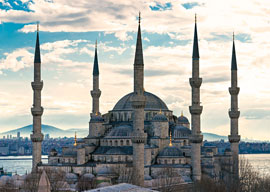
June 19, 2013

Blue Mosque
Source: Shutterstock
Watching the news of protests in Istanbul, I”m reminded of the time I required a Turkish private detective’s services.
I was in Turkey and had to get the answer to an important personal question.
I had tried all the proper channels, spending many fruitless hours on the phone with very nice Turkish customer-service representatives who worked as hard as they could to answer my question. They were”in the characteristic Turkish manner”polite, concerned, and desirous of being helpful.
They also weren”t very effectual. Turkey is not a country set up around the principle of data transparency. Stewart Brand’s old cyberspace mantra “Information wants to be free“ is not the kind of idea that would automatically occur to a Turk. Instead, information wants to be hoarded, passed along only face-to-face.
Then there was a knock on my door, and I was introduced to an older gentleman. He didn”t speak any English, but he was described as having worked in “Security.” (The word was enunciated in such a way that I could hear it was capitalized.) He had, it was added, close relatives currently working in Security.
No more explanation was offered. Puzzled, I responded that while I much appreciated this offer of assistance, I had called every imaginable authority and they simply didn”t know the answer to my question. So I didn”t see how anybody could find out anything.
No, it was explained to me again, more slowly: This man was in Security. Just write down what you need to know on this piece of paper and he will get the answer.
A couple of hours later, he returned with exactly what I had wanted to hear, to a couple of decimal places.
I asked the interpreter: “How does he know that?”
“Security computers.”
I came home from Turkey impressed by the inhabitants” respectability, the scenic beauty, the reasonable prices (having been kept out of the European Union for not being all that European, Turkey dodged the euro bullet that flattened the rival Greek economy), and the omnipresence of the past. Most of all, I realized that I didn”t have a clue what was going on behind closed doors in Turkey. The place really is byzantine, intricate, and opaque.
It’s extraordinarily difficult to come up with an analogy to American history that would shed some light on Turkish politics since the beginning of the 20th century.
All right, try this: Imagine that in 1908 the most advanced thinkers of Cambridge, Massachusetts, and Greenwich Village take over the US Army. They eventually move the capital to Omaha and rename the country the Midwestern Republic. Yet the four times the country elects somebody a little more Christian than a Unitarian Universalist, the Army stages a coup.
Finally, the Midwesterners stare down the Army. To rub in their long-thwarted dominance, the Midwestern Christian Party then orders all the bars in New York City to close at 10PM, driving New Yorkers into Times Square to protest.
Does that clear everything up?
No, I guess it doesn”t.
But that’s kind of the point. The more I”ve learned about Turkey’s past, the more I realize how little I know. The old, weird world centered around Constantinople, the Caput Mundi of the Middle Ages.
Byzantium was renamed Constantinople in 330AD by the Emperor Constantine. He chose it to be the new capital of the Roman Empire due both to its strategically supreme location on the Bosphorus Straits dividing Europe from Asia and its tactically defensible site on the Golden Horn. Napoleon, no small judge of geography, said, “If the Earth were a single state, Istanbul would be its capital.”
After the Ottoman Turks finally conquered it in 1453, the renamed Istanbul ruled their vast domain. As the once dynamic Ottoman Empire slowly decayed into the “sick man of Europe,” it became the world capital of conspiracy theorizing.
Turks admire a good conspiracy theory. They”re not really into Occam’s Razor. The smartest guy in the room isn”t the one with the simplest explanation; he’s the one whose idea has the most convolutions.
A few years ago, Turkish Prime Minister Recep Tayyip ErdoÄan arrested hundreds of military officers on charges of participating in giant conspiracy to overthrow his Islamic party’s rule called Ergenekon. The military men protested their innocence, but many in Turkey seemed to feel that since Erdogan was plotting against the generals, it would have been silly of the generals not to plot against him.
Or consider a historical example. You”ve noticed that some people are obsessed with the Freemasons, which seems comical. Why the Masons instead of the Elks or the Shriners? (Well, there is that eyeball atop the pyramid on the dollar bill….)
Yet in the Ottoman Empire, Masonic lodges actually were centers of secular modernism and revolutionary intrigue against the Sultan. Why? All those years learning secret handshakes deterred quick infiltration by the secret police. (In the English-speaking world, we find conspiracy theories about Freemasons funny because the Masons, such as Ben Franklin and George Washington, more or less won.)